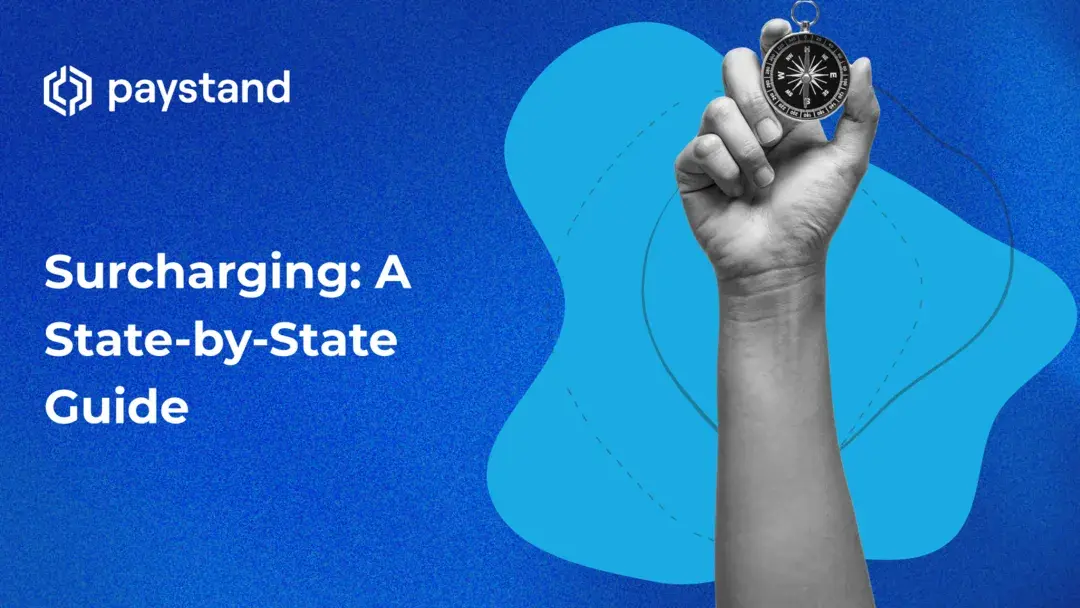Surcharging: A State-by-State Guide

Note: This article is for informational purposes only and does not constitute legal advice. Paystand offers several methods to help offset or eliminate transaction fees. Surcharging is not one of those methods.
Table of Contents
- Can Business Surcharge Customers?
- Why is Surcharging Controversial
- How does Surcharging impact Payments?
- Are Credit Card Surcharges Legal in the U.S.?
- Best Practices for Surcharging
- Cash Discounting vs. Surcharging
- The Paystand Alternative
Key Takeaways
- Surcharging Rules Vary: Legal in most states but prohibited in some. Always verify state laws.
- Consumers Dislike Surcharges: Many customers avoid businesses with surcharges. Offering fee-free options can improve retention.
- Best Practices Matter: Follow guidelines like notifying customers and checking credit card rules.
- Cash Discounting is Legal Nationwide: Offering discounts for non-card payments is an effective, legal alternative.
- Paystand's Zero-Fee Solution: Paystand provides a zero-fee, B2B payment network to help reduce costs without surcharges.
Can businesses surcharge customers for credit card payments to compensate for processing fees? The broad answer is "most of the time."
Surcharging is legal in most U.S. states but prohibited or restricted in a few. Learn some surcharging best practices, such as investigating and following regulations and notifying customers and card companies.
Most legacy payment methods carry a transaction fee. However, credit card companies have the most volatile fees in the B2B payments market. Ranging from 2.5% to 4% per transaction, some businesses pass those processing fees to customers.
But why is surcharging so controversial in the payment industry? Surcharging is when a merchant adds a fee to a customer's credit card transaction. This compensates for the credit card processing/interchange fees businesses pay to credit card companies for using their payment network.
Some credit cards have strict regulations on surcharging, and some states' consumer protection laws prohibit it altogether, meaning the practice's legality varies from state to state.
To help you avoid card processing fees, we've compiled an overview of surcharging and its legality across the country.
Can Businesses Surcharge Customers for Credit Card Payments?
While surcharging is generally legal in most U.S. states, it is prohibited or restricted in a few. Businesses should always consult local laws, as regulations vary, and compliance requires notifying customers and card networks before implementing surcharges. Paystand offers alternative ways to manage or eliminate transaction fees without relying on surcharging.
Why is Surcharging Controversial?
Surcharging is the practice of passing credit card processing fees (typically 2.5%-4%) onto customers. Although common, it can be unpopular with consumers. For instance, 71% of customers may avoid merchants who add surcharges, and 64.5% of customers would consider stopping credit card use altogether if surcharges were added.
What is Considered a Surcharge, and How Do They Affect Payments?
A surcharge is a fee a merchant adds to cover credit card transaction costs, but this practice can deter customers. Many prefer to use payment methods without added fees, such as ACH transfers or bank payments. Cash discounting, where a discount is offered for alternative payments, often appeals more to customers than surcharges and is legal in all U.S. states.
Are Credit Card Surcharges Legal in the U.S.?
Credit card surcharging laws are complex. Some states, like Connecticut and Massachusetts, have outright bans on surcharges, while others, such as California and Texas, have undergone legal challenges that leave enforcement uncertain. In states where surcharging is allowed, regulations usually cap the surcharge at 3-4% and require clear, upfront disclosure to customers at the point of sale and on receipts.
Best Practices for Surcharging
- Investigate and Follow Regulations – Even if surcharging is permitted, rules differ by state and card network. Check with legal counsel and payment providers for guidance.
- Notify Customers and Card Companies – Transparency is key. Inform customers before applying surcharges and notify credit card companies of your intent to surcharge as per their guidelines.
Cash Discounting vs. Surcharging
Cash discounting offers an alternative approach by giving customers a discount for using non-card payment methods, such as cash, debit, or check, instead of adding fees for credit cards. This approach is legal in all U.S. states and provides a “zero-fee” option that avoids the complexity of surcharging.
The Paystand Alternative to Surcharging
For businesses looking to avoid the complexities of surcharging, Paystand offers an alternative: a zero-fee, subscription-based payment network that reduces or eliminates transaction fees. By leveraging the Paystand Bank Network, businesses can save significantly on credit card fees while providing customers with fee-free payment options, fostering a positive customer experience without relying on surcharges.
With Paystand, you can provide multiple payment options, with and without transaction fees. Prevent high credit card processing fees from cutting into your ROI by encouraging customers to pay via the Paystand Bank Network using our Payer Incentives Feature.
Ready to simplify payment processing and reduce fees? Learn how future finance trends are making reduced fees a reality.








%20(1)%20(1).jpg?width=100&height=100&name=IMG_3752%20(1)%20(1)%20(1).jpg)